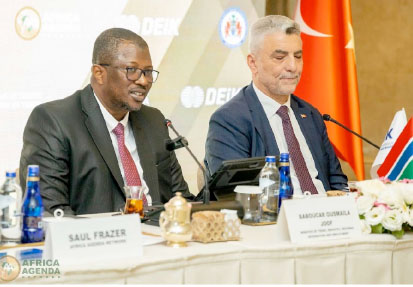
Chairperson, please allow me to express sincere condolences on behalf of the President of the Republic of The Gambia, H.E. Adama Barrow and the Africa group, to the President and the people of Türkiye following the recent terrorist attack on the peaceful and tolerant people of Turkiye, which resulted to loss of lives.
In addition, behalf of the Africa region, I wish to express our heartfelt condolences to our brothers and sisters in Palestine for the on-going and unabating slaughter of the Palestinian people and the people of Lebanon, and now Iran. We condemn in the strongest possible terms the Israel genocidal war on the people of Palestine and the people of Lebanon. We pray that the almighty Allah comes intervenes by stopping the suffering of our brothers and sisters.
I would also like to profoundly thank COMCEC Coordinating Office under the dynamic leadership of the Secretary General and his staff for the excellent organization of both the experts and ministerial meetings.
Mr. Chairperson, Your Excellencies
As you are aware, my country the Republic of The Gambia holds the chair of the 15th OIC Summit, which was held in Banjul from 4th to 5th May 2024. On behalf of the Chairman H.E. Mr. Adama Barrow, the President of the Republic of The Gambia, I would like to use this opportunity to extend our heartfelt appreciation and gratitude to the Secretary General of OIC Mr. Hussein Ibrahim Taha, the esteemed representatives of Member States and to all the OIC Institutions and Agencies who supported The Gambia in making the event a successful one. We hope that through our continued dedication and cooperation, we can deliver on the outcomes of the Summit.
Mr. Chairperson, Your Excellencies
It is important to remember that COMCEC Ministerial sessions are a direct reflection on the implementation of COMCEC strategy and Action Plan. It provides a platform to asses our past performance and plan for the future as well as to produce and disseminate knowledge, share experiences and best-practices. The convergence also gives us an opportunity to develop a common discourse and understanding on topical issues, as well as adopt appropriate policies among Member Countries, to address and find solutions to the development challenges of the Islamic Ummah. As the Dhaka Declaration emphases, intra-OIC cooperation is an integral part of our commitment to drive socio-economic development of the OIC member states.
Mr. Chairperson, Your Excellencies
Intra-OIC trade is instrumental to the development of our economies and therefore we must promote trade among member states. An increase in intra-OIC trade would boast economic growth, increase employment and reduce poverty. It would facilitate innovation and promote development in science and technology as well as better integrate our economies into a global value chain as it enhances our competitiveness.
Mr. Chairperson, Your Excellencies
The theme for this Ministerial session "Digital Transformation of Payment Systems in OIC Member Countries" could not come at a better time than this when The Gambia like many other OIC member states is putting conscious effort in develop her digital trade to support the recovery process from the impact of COVID 19.
Digital Transformation of payment systems is a cardinal pillar of digital trade which offers the opportunity to trade even during global pandemics. In today’s evolving global economy, digital payment systems have become central to how we conduct trade, both within and across our borders. The digital transformation of payment systems therefore, is not just a technological imperative; it is a foundational pillar for economic growth, financial inclusion, and regional integration. The Government of the Gambia, under the Leadership of H.E President Adama Barrow believes that embracing digital technologies is not only a necessity, but an opportunity to enhance governance and foster economic development.
Mr. Chairperson, Your Excellencies
In The Gambia, we have recognized the crucial role of digital payment systems in driving our economic development through digital trade. The recent developments in our payment infrastructure reflect this commitment. Notably, the Central Bank of The Gambia (CBG) is currently undertaking an extensive upgrade of our national payment system. This upgrade aims to ensure the system is robust, interoperable, and responsive to the evolving needs of our economy, providing seamless and secure digital financial services delivery system for all citizens and businesses.
Moreover, we are also reviewing the Payment Systems Act to align it with new realities in the payment ecosystem, particularly in the areas of fintech development, digital currencies, and cross-border transactions. These legislative reforms, it is envisaged, will create a more enabling environment for innovation while ensuring security, consumer protection, and financial stability.
Mr. Chairperson, Your Excellencies
On the regional front, The Gambia is an active participant in the AfCFTA Negotiations. One of the innovative instruments designed to support the implementation of this land mark agreement is the Pan-African Payment and Settlement System (PAPSS) - a groundbreaking cross-border payment initiative aimed at facilitating intra-African trade. A number of commercial banks including Bloom Bank, VESTA Bank, ECO Bank and Access Bank have already deployed and operationalised the PAPSS. Through PAPSS, we aim to simplify and reduce the cost of cross-border transactions, enhancing the ease of doing business between OIC Member States within the African continent.
Mr. Chairperson, Your Excellencies
The digital transformation of payment systems is not a journey that we can undertake in isolation. Collaboration among OIC Member Countries is essential. Together, we represent a market of over 1.8 billion people, with enormous potential for economic cooperation and integration. To harness this potential, we must work towards creating integrated payment systems that facilitate trade, commerce, and financial services across our nations. By enhancing interoperability between our digital payment platforms, we can ensure that businesses and consumers in our member countries have seamless access to financial services, regardless of geographical boundaries.
It is equally essential that we establish a common regulatory framework that addresses the unique needs of digital payment systems, including data security, anti-money laundering, and cross-border transaction protocols. A harmonized approach will create an environment conducive to innovation, encourage investments, and foster trust in the digital economy. For the digital transformation of our payment systems to succeed, we must also invest in the infrastructure and fintech ecosystems that underpin them.
Mr. Chairperson, Your Excellencies
In conclusion, as we move forward, we must remain committed to embracing digital transformation in a way that supports economic growth, promotes financial inclusion, and strengthens our interconnectedness as OIC Member Countries. Our efforts must be guided by a shared vision, one where digital payment systems are not only a means of transaction but a gateway to economic opportunity for every country. Together, we can build a future where trade and commerce seamlessly flow across borders, driven by digital technologies for our shared prosperity.
I thank you for your attention.




